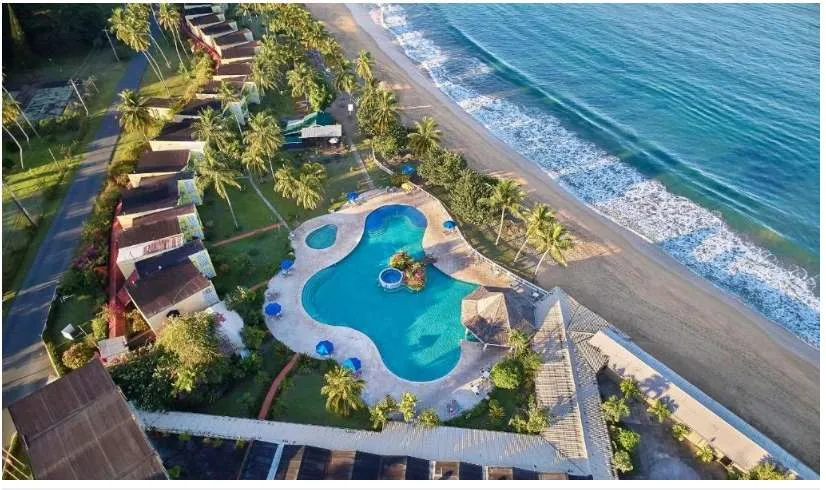In a horror attack reminiscent of the sensational seventies movie Jaws, a British tourist was attacked from behind by a shark that swam up on a group of early-morning bathers at an idyllic beach in the island of Tobago.
The 64-year-old victim is in hospital in intensive care fighting for his life with serious injuries which were to his left arm, left leg and abdomen, according to alocal official, Farley Augustine.
He said the man had been attacked 10 metres off the shore in Courland Bay, on the island’s north coast, at 09:15 a.m. on Friday.
A swathe of beaches along the north-western coastline of Tobago spanning from Pigeon Point to Plymouth has now been ordered closed to the public until further notice as a precaution.
Chief Secretary Farley Augustine in a Facebook post said seven beaches have been temporarily closed after reports of a shark being spotted in the Grafton beach area. (Warning to readers: The above link to Facebook is provided as a courtesy, but readers are warned that it contains photographs of injuries that some may find upsetting.)
Beaches at Plymouth, Courland Bay, Black Rock, Mt Irvine, Buccoo, Pigeon Point, Store Bay and all coastal areas in between were temporarily closed on April 26. Augustine said reef tours in those areas were also temporarily suspended.
The British Foreign Office said it was supporting the victim’s family.
The incident involved a bull shark estimated to be eight to 10 ft (2.4m to 3m) long and 2ft (60cm) wide, according to a statement by the Tobago House of Assembly.
In a press briefing late on Friday, Chief Secretary Farley Augustine said the injured man was “stable and doing well”, but remained in an ICU and was being kept under sedation.
He said the man had had some fingers reattached but still had “significant wounds” to one of his legs and would require “extensive work”.
“The task at this time for our health professionals is really to stabilise and ensure that we can save life and limb as much as possible,” he said.
Mr Augustine said the man had been in Tobago with his wife and friends, and that the group had been due to fly home on Friday.
He added that the local government was working closely with the British High Commission to “ensure that the family gets all that they need during this difficult time”.
Eyewitness Orion Jakerov, water sports manager at the nearby Starfish Hotel, said other people in the water were “physically trying to fight off the shark”.
He told the local broadcaster TTT Live: “I don’t think they saw it. They were about waist height in the water so they weren’t out of their depth.
“I think their backs were turned and they were just kind of lounging around. Nobody saw the shark coming.”
Authorities closed seven beaches and all coastal areas between the town of Plymouth on the island’s northern coast and Store Bay on its western tip, a stretch of around seven miles (11.3km).
The stretch also includes a marine park surrounding the Bucco Reef, one of the island’s largest coral reefs and a popular tourist attraction.
Drones were being used to carry out surveillance of the area, and anyone operating a boat was urged to exercise caution.
Officials said the closures had been enacted “out of an abundance of caution” and would remain in place on Saturday.
They also said they would “neutralise the threat if possible”.
Mr Augustine said in a Facebook press briefing that a $10,000 bounty previously offered to anyone who could capture the shark and move it away from the beaches had been retracted.
He said there there had been confusion over the reward and that it was being retracted. “I’ve asked for the ad to be retracted effective immediately and I’ve asked that the fishers work along with the Coast Guard, work along with the divers and other stakeholders to expertly man the area,” he said.
Bull sharks are known to be aggressive and are most often found in shallow waters along tropical coastlines, making them – along with great white and tiger sharks – among the species most likely to come into contact with, and attack, humans.
Tobago, one of the constituent islands of Trinidad and Tobago, is located in the southern Caribbean, around 74 miles (119km) off the coast of South America and shark attacks there are extremely rare.
According to the International Shark Attack File database, the vast majority of shark attacks in the region occur further north, in the central Caribbean and off the eastern and southern coasts of the US.
In the last 20 years, there have been only two recorded shark attacks as far south as Tobago, and neither of them was anywhere near Tobago.



























